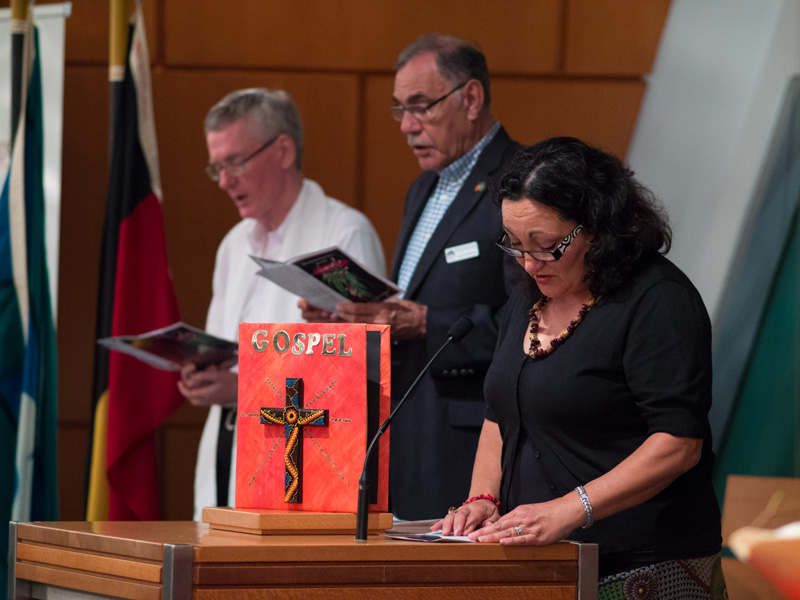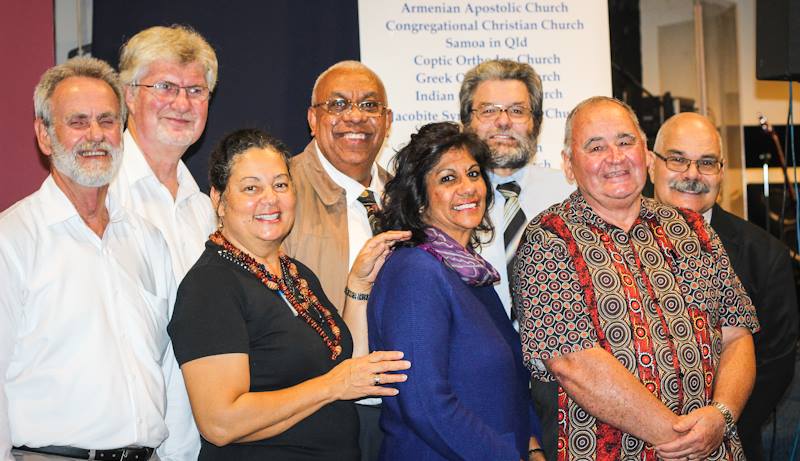Churches Together Indigenous People's Partnership
Aims
CTIPP's overall purpose is to help churches work together for reconciliation between Indigenous and non-Indigenous Australians. The geographical focus is Queensland.
CTIPP endeavours to:
- promote an understanding of Indigenous cultures and spiritualities and their significance not only to the churches but to the wider Australian community;
- promote an understanding of our shared history and the ongoing social and economic disadvantage of Indigenous people;
- encourage involvement in programs that redress this disadvantage, promoting mutual respect, acceptance, justice and equity for all.
History
In February 1998, the member churches of Queensland Churches Together made an historic commitment to work towards partnership with Indigenous peoples of Australia. In so doing they acknowledged the injustices which Aboriginal and Torres Strait Islander peoples had been facing for over 200 years.
No unity without reconciliation
It was not, however, simply a recognition of inequities in Australian society. The commitment showed that the integrity of the Christian faith in Australia required the pursuit of a genuine partnership between Indigenous and other communities across the land. As an ecumenical council, QCT acknowledged that there could not be true unity between the churches without reconciliation between the different peoples of this land.
How did QCT's member churches arrive at this point?
In 1992, after ten years of consultation and collaboration, the High Court of Australia granted Native Title Rights to the Meriam people.
"Churches Together Mabo Group"
It was this decision, along with the vision of reconciliation and the death in custody of Daniel Yock in 1993, that led a small ecumenical group to come together as the Churches Together Mabo Group.
Initially the group was concerned with raising awareness within the Church of the need for reconciliation and a better understanding of the issues surrounding Native Title, deaths in custody, racism and social justice.
The role of the Churches Together Mabo Group was to bring churches into contact with justice issues that affected the 'way of life' of Aboriginal and Torres Strait Islander peoples. Where possible the group also aimed to act as a conduit between the churches of Australia and the Aboriginal and Torres Strait Islander peoples. It sought to collaborate with other organizations in the pursuit of justice.
The group saw the need to employ an Indigenous person to co-ordinate the group's activities and to ensure that church leadership was informed of the impacts of Government policy and intervention on Indigenous communities. Funding was sought to this end. The Roman Catholic Church provided some seed funding, and other member churches of Queensland Churches Together (QCT) later followed suit. Joan Hendriks became the first Coordinator of CTIPP.
A commission of QCT

2014 Bracken Ridge Service of Reconciliation
The Churches Together Mabo Group was officially constituted as a commission of QCT and adopted the name of Churches Together Aboriginal Partnership (CTAP). CTAP later became CTIPP – Churches Together Indigenous People's Partnership – to reflect the inclusion of Torres Strait Islander people and history in the program.

2014 Logan Service of Reconciliation with representatives from QCT, CTIPP and Service Organisers
CTIPP is currently funded through contributions from the Anglican, Catholic, Uniting and Lutheran Churches as well as by small grants. Additional funding is being sought – and donations are very welcome (see Support QCT).
Past CTIPP Activities
The activities of CTIPP were designed to promote reconciliation within the Christian churches in Queensland and to help them become agents of reconciliation in the wider community. In the initial years of the programme, the focus was on workshops held by the Coordinator and volunteer resource worker of CTIPP in church communities. In this way many people heard stories told by Indigenous people, stories of injustice but also of celebration and resilience. The listeners learned to connect these with their own stories. In a non-threatening atmosphere, participants reflected on the separate and shared histories of the different peoples of Australia.
CTIPP facilitators always emphasized the contribution Indigenous people make and have made to many walks of life in Australia, including the churches.
Workshops such as the ones carried out by CTIPP helped non-Indigenous people to:
- develop an understanding of the causes of the present disadvantage experienced by Indigenous people in Australia;
- create a church that is inclusive and Indigenous-friendly;
- observe and respect Indigenous protocols;
relate sensitively to Indigenous people in the local area; - create opportunities for local communities to learn from each other's cultures, spiritualities and ways of living with the land.
Subscribe to our newsletter
Sign up to receive updates from Queensland Churches Together.
GENERAL ENQUIRIES
PO Box 2096 Toowong Qld 4066
Dr Kate Power, General Secretary
Phone: (07) 3369 6792
Email: gensec@qct.org.au
Jackie Fewtrell, Administration Officer
Phone: (07) 3369 6792
Email: admin@qct.org.au



